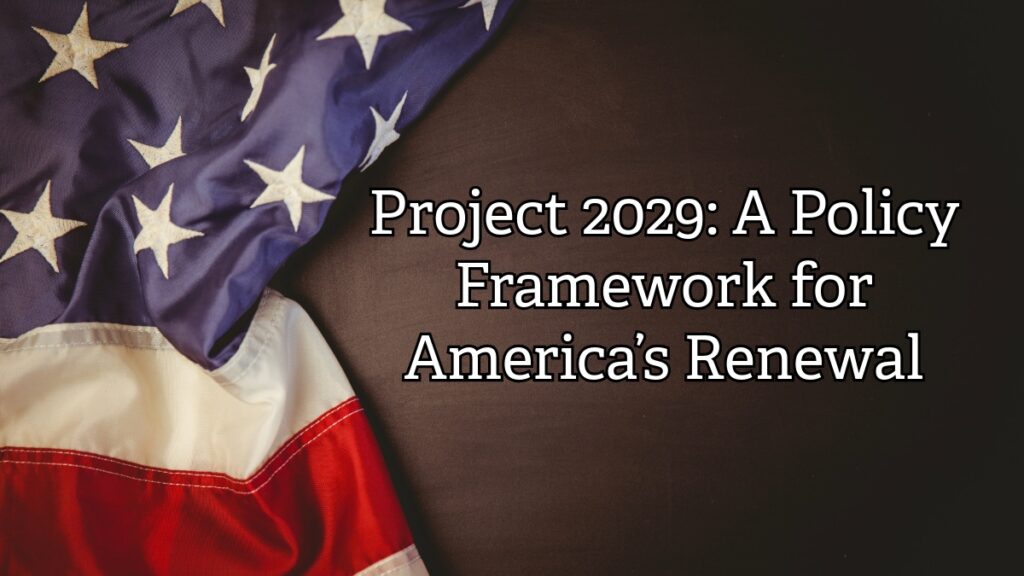

Project 2029: A Policy Framework for America’s Renewal
Project 2029: A Policy Framework for America’s Renewal
Executive Summary
Project 2029 is a comprehensive governing agenda designed to strengthen the foundations of American democracy, modernize the economy, safeguard individual freedoms, and secure the nation’s role in a rapidly changing world. Unlike short-term policy cycles, Project 2029 establishes a long-term framework to guide decision-making over the next decade.
The guiding principle of Project 2029 is balance: between growth and equity, liberty and responsibility, sovereignty and cooperation, innovation and tradition. By 2029, America must emerge as a nation that is economically competitive, environmentally resilient, technologically advanced, and socially cohesive.
Guiding Philosophy
Democracy First – The legitimacy of government derives from the people; safeguarding access, fairness, and transparency is paramount.
Shared Prosperity – Economic growth is strongest when opportunity is broadly distributed, ensuring no region or demographic is left behind.
Resilient America – National strength is measured not only in military might but in infrastructure, health, energy, and civic trust.
Innovation with Integrity – Technology must serve humanity, with ethical guardrails protecting privacy, security, and dignity.
Global Engagement – America’s leadership rests on alliances, diplomacy, and economic strength, not isolation or unilateralism.
Policy Pillars
I. Democratic Renewal
Establish independent, bipartisan commissions for redistricting.
Enact a Federal Voting Rights Act guaranteeing uniform standards for ballot access.
Increase government transparency through mandatory disclosure of political contributions and lobbying expenditures.
Declare Election Day a national holiday; expand early and mail-in voting.
II. Economic Competitiveness & Fairness
Future Works Program: Large-scale federal-state partnership to retrain workers in artificial intelligence, robotics, renewable energy, and advanced manufacturing.
Support small and medium-sized enterprises (SMEs) through tax incentives for local hiring and innovation grants.
Reform tax code to close loopholes and ensure corporations pay a fair share.
Invest in regional economic diversification, especially in rural and post-industrial areas.
III. Healthcare & Public Well-Being
Expand affordable healthcare through a public-private hybrid model.
Cap prescription drug prices by tying them to global benchmarks.
Implement a national mental health strategy, integrating behavioral health into primary care.
Create a pandemic preparedness corps with federal coordination and rapid-response capabilities.
IV. Energy, Climate & Infrastructure
American Resilience Act: Invest in flood barriers, wildfire defense systems, and grid modernization.
Transition plan: sustain oil & gas capacity while accelerating investment in wind, solar, nuclear, and hydrogen.
Nationwide tax credits for households adopting energy-efficient appliances, solar roofs, and EVs.
Federal Green Procurement Standard: require government contracts to prioritize clean energy suppliers.
V. Education & Workforce Development
Universal pre-kindergarten for all American children.
Tuition-free community college for qualified students.
Student debt reform: automatic income-based repayment capped at a fixed share of earnings.
Federal support for apprenticeship and vocational training aligned with high-demand industries.
VI. Technology & Security
Enact an AI Bill of Rights protecting citizens’ privacy, data ownership, and algorithmic transparency.
Establish a federal Cybersecurity Coordination Agency to unify defense against digital threats.
Universal broadband by 2029; federal investment in 6G infrastructure.
Encourage public-private partnerships for emerging tech R&D (quantum computing, biotech, clean energy).
VII. Foreign Policy & National Security
Reinforce NATO and Indo-Pacific alliances; expand joint exercises and technology sharing.
Lead global climate and health initiatives, positioning the U.S. as a solutions partner.
Negotiate fair trade agreements prioritizing U.S. labor and environmental protections.
Modernize armed forces with a focus on cyber, space, and unmanned systems.
Implementation Framework
Timeline: 2025–2029 phased rollout, prioritizing election security, infrastructure resilience, and workforce training.
Governance: Interagency coordination through a new National Renewal Council reporting directly to the President.
Funding: Combination of tax reform, strategic spending reallocation, and public-private partnerships.
Metrics: Annual progress report measuring democratic participation, GDP growth by region, carbon emissions, and healthcare outcomes.
Conclusion
Project 2029 is not a partisan manifesto but a national blueprint for resilience and renewal. It recognizes that America’s greatest strength lies in adaptability: the ability to confront challenges directly, innovate boldly, and unite around shared values. By 2029, the United States can secure its place as a free, prosperous, and forward-looking nation prepared for the century ahead.